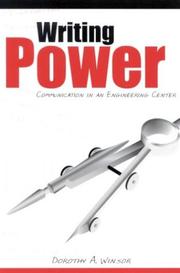| Listing 1 - 5 of 5 |
Sort by
|
Book
ISBN: 1283895889 1606502530 9781606502532 9781283895880 1606502514 9781606502518 Year: 2012 Publisher: [New York, N.Y.] (222 East 46th Street, New York, NY 10017) Momentum Press
Abstract | Keywords | Export | Availability | Bookmark
 Loading...
Loading...Choose an application
- Reference Manager
- EndNote
- RefWorks (Direct export to RefWorks)
Everyone knows about the rising phenomena of social media, but what does that have to do with you, the engineer? What about engineers looking for employment? And can you really push your consultancy business, publication, and more to establish your own personal brand? Do engineering companies really need social media? Social networks are both a blessing and a curse to the engineer and scientist. The blessings are apparent: the abundance of free applications and their increasing mobility and transportability. The curse is that creating interesting and compelling content on these user-driven systems is best served by right-brain skills. But most engineers and scientists are left-brain oriented, and have generally shunned the right-brain skills like graphic design and creative writing as being indulgent and time wasting. This new book shows you how to develop better "right brain" skills and apply them to social media like Facebook, Twitter, LinkedIn and others, where so much professional communication, marketing, promoting and even collaborative technical work is taking place today.

ISBN: 0791486702 9780791486702 9780791457580 0791457583 0791457575 0791457583 9780791457573 Year: 2003 Publisher: Albany State University of New York Press
Abstract | Keywords | Export | Availability | Bookmark
 Loading...
Loading...Choose an application
- Reference Manager
- EndNote
- RefWorks (Direct export to RefWorks)
Winner of the 2004 Distinguished Publication on Business Communication presented by the Association of Business CommunicationWriting Power examines the way that texts, knowledge, and hierarchy generate and support one another within a for-profit corporation. By encouraging us to see texts and writing as powerful operators in the corporate world, this book presents a case study focused on how one engineering organization uses texts to create and maintain its knowledge and power structure. Based on over five years of observations, the book describes the co-generation of power/knowledge/text from several points of view, including that of managers, engineers, interns, and blue-collar workers. These groups of people use texts to build knowledge within their own areas and establish control over their work when it is passed along to the other groups. Employing Bourdieu's notion that people possess different kinds of "capital" that can be converted to one another under the right circumstances, the book demonstrates that text is one of the major ways that this conversion of capital takes place, and is thus one of the major ways that power and knowledge are generated and accumulated.
Communication in engineering. --- Technical writing. --- Engineering --- Science --- Scientific writing --- Technology --- Authorship --- Communication of technical information

ISBN: 0203049969 1283968584 1136414568 9781136414565 0789021773 9780789021779 0789021781 9780789021786 9781136414633 1136414630 9780203049969 9781136414701 Year: 2004 Publisher: Binghamton, NY Haworth Information Press
Abstract | Keywords | Export | Availability | Bookmark
 Loading...
Loading...Choose an application
- Reference Manager
- EndNote
- RefWorks (Direct export to RefWorks)
Stay on top with the latest developments in scientific and technical journal publications! In Scholarly Communication in Science and Engineering Research in Higher Education, experts in the academic community propose cost-effective alternatives to commercial publications in the face of increased journal prices and reduced budgets. This book discusses recent technological innovations that can maintain the needs of researchers who need to stay on the cutting edge of science and technology as well as scholars who must be published and peer-reviewed in order to achieve tenure and promotio
Communication in science. --- Communication in engineering. --- Engineering --- Communication in research --- Science communication --- Science information --- Scientific communications --- Science
Book
ISBN: 9780128026724 0128026723 0128025794 9780128025796 Year: 2018 Publisher: London, United Kingdom : Academic Press, an imprint of Elsevier,
Abstract | Keywords | Export | Availability | Bookmark
 Loading...
Loading...Choose an application
- Reference Manager
- EndNote
- RefWorks (Direct export to RefWorks)
Communicating as Women in STEM discusses various communication styles, also demonstrating how principles can be applied during interpersonal interactions in day-to-day environments. It provides women and other underrepresented groups, faculty and administrators with the tools they need to break barriers raised by different communication styles within the STEM fields. Sections cover tactics on how to become more aware of communication patterns and how to cope with, and improve, communication. This practical resource for women in the STEM fields is also ideal for mentors, educators, advisers and organizations interested in encouraging women to choose and remain in these fields. -- Provided by publisher.
Women --- Communication in science. --- Communication in engineering. --- Communication. --- Communication --- Engineering --- Communication in research --- Science communication --- Science information --- Scientific communications --- Science
Book
ISBN: 9780817394240 0817394249 9780817321420 Year: 2023 Publisher: Tuscaloosa, Ala The University of Alabama Press
Abstract | Keywords | Export | Availability | Bookmark
 Loading...
Loading...Choose an application
- Reference Manager
- EndNote
- RefWorks (Direct export to RefWorks)
"This work exposes the deeply worrying state of discourse over geoengineering-the intentional manipulation of the earth's climate as means to halt or reverse global warming. These climate-altering projects, which range from cloud-whitening to carbon dioxide removal and from stratospheric aerosol injection to enhanced weathering, are all technological solutions to more complex geosocial problems. Geoengineering represents one of the most alarming forms of deliberative discourse in the twenty-first century. Yet geoengineering could easily generate as much harm as the environmental traumas it seeks to cure. Complicating these deliberations is the scarcity of public discussion. Most deliberations transpire within policy groups, behind the closed doors of climate-oriented startups, between subject-matter experts at scientific conferences, or in the disciplinary jargon of research journals. Further, much of this conversation occurs primarily in the West. Ehren Helmut Pflugfelder makes clear how the deliberative rhetorical strategies coming from geoengineering advocates have been largely deceptive, hegemonic, deterministic, and exploitative. In this volume, he investigates how geoengineering proponents marshal geologic actors into their arguments-and how current discourse could lead to a greater exploitation of the earth in the future. Pflugfelder's goal is to understand the structure, content, purpose, and effect of these discourses, raise the alarm about their deliberative directions, and help us rethink our approach to the climate. In highlighting both the inherent problems of the discourses and the ways geologic rhetoric can be made productive, he attempts to give "the geologic" a place at the table to better understand the roles that all earth systems continue to play in our lives, now and for years to come"--
| Listing 1 - 5 of 5 |
Sort by
|

 Search
Search Feedback
Feedback About UniCat
About UniCat  Help
Help News
News